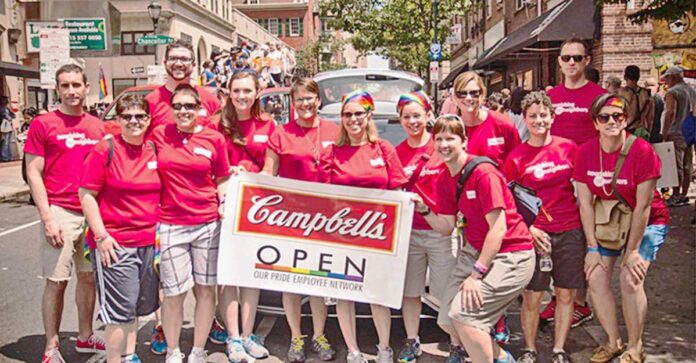Campbell Soup Company was among the many organizations to celebrate Pride Month. More specifically, the Camden-based company’s employee resource group Our Pride Employee Network (OPEN) participated in a virtual 5K and Fun Run to support William Way LGBT Community Center.
Employee resource groups, or ERGs, such as OPEN not only participate in events such as these. They also actively work to provide resources, trainings, and general support for marginalized individuals within a company. Kurt Yasenchak, the co-chair of OPEN, said “it’s important for companies to encourage diversity and demonstrate support for employees of similar backgrounds or affinities and show how they are supporting all different groups.”
“Employees are not cookie cutter and should be treated as individuals,” Yasenchak said. “Embracing ERGs offers motivation and power to live into being your true self. ERGs show that a company wants and needs you to bring your true self to work.”
The first ERG came about in response to race-based tension and violence in the 1960s. Former Xerox CEO Joseph Wilson and the company’s Black employees came up with an idea to respond to the 1964 Rochester race riot in New York. Xerox, which was also based in Rochester, had a progressive hiring program but Black employees still faced workplace discrimation. In 1970, Wilson and the employees launched the National Black Employees Caucus. This served as a space for Black employees to network with each other, discuss their experiences and create change within the company.
Xerox later expanded to include more ERGs for different marginalized voices, and other companies soon followed suit. Hewlett Packard is believed to have started the first LGBTQ ERG in 1978. Now more than four decades later, ERGs have become commonplace, including in and around the Philadelphia area.
The City of Philadelphia offers City Resource Groups, its version of ERGs. Lauren Cox, a city spokesperson, noted that “through engaging conversations, presentations, and regular updates from cross-departmental teams, participants have been able to learn more about the rights and protections afforded to them as LGBTQ City employees.” Additionally, Cox said the city tries to deliver a more affirming workplace for its employees “through mutual support, education, and resources” since the LGBTQ+ City Resource Group launched in January 2019. One initiative involved them working with the Office of LGBT Affairs to promote the inclusion of pronouns in city email signatures and bios.
“Engagement around specific issues such as this provide meaningful opportunities for staff and employees to show up as their true authentic selves in the workplace, knowing that there is a supportive environment in place for them at the City,” Cox said.
In addition to affirming LGBTQ people, some ERGs also strive to educate allies. PECO recently invited transgender activist Deja Lynn Alvarez to present a “Trans 101” seminar. Nicholas Hollup, the senior training specialist and president of the energy company’s PRIDE ERG, said Alvarez began the presentation by saying if anyone had a question, she was available to answer it.
“Answering the same questions over and over again is tiring, to put it lightly,” Hollup said. “When you work with people every day, you want to share your experiences with them, and have them share with you; however, the gap between the LGBTQ+ community and the heteronormative culture leaves a lot of well-intentioned people with questions. By providing these informational events, we strive to give everyone a baseline of knowledge to facilitate open and respectful conversations.”
The leaders of many ERGs also realize the work doesn’t end in the office. Ash Hanson, Aramark’s Chief Diversity & Sustainability Officer, said that even though the company maintained a 100 percent score with the Human Rights Campaign’s Corporate Equality Index for the last six years, they prioritize intersectionality and “understand that our employees are complex individuals with intersecting identities.”
“That’s why celebrating the unique backgrounds of our employees is ingrained in what we do,” Hanson said. “We have company-wide celebrations throughout the year for events like Pride Month, Women’s History Month, Black History Month, Hispanic Heritage Month, etc. During these times, we are able to create resources, programs, and events that create a culture of inclusion and belonging, and that encourage employees to bring their whole selves to work.”
Meanwhile Independence Blue Cross provides benefits for LGBTQ employees even outside of the office.
“Independence’s employee benefits and related policies are inclusive of domestic partners and life partners and their children,” said John Clayton, the health insurer’s director of diversity & inclusion and workforce initiatives. “In addition, we cover transgender benefits in accordance with the Non-Discrimination Act.”
However, there are still issues ERGs can combat. Yasenchak said trans individuals face the most challenges but ERGs can provide “education about gender identity and the use of pronouns.”
“Companies should evaluate services, benefits, policy and facilities to make sure that there is equity for everyone,” Yasenchak said.
Hollup added that changing language used in HR policies, such as differentiating between “gender transition” and “gender affirmation,” can minimize stigmatization and discrimination.“As we engage in important conversations about gender identity and sexual orientation, we can continue to foster a culture of inclusion,” Hollup said. “With the help of ERGs, we can learn to interact thoughtfully and intentionally to make sure everyone feels at home in the workplace.”
